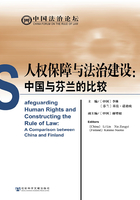
Causes of the Unsatisfactory Effect of Environmental Laws in China
【Abstract】 Although environmental law is a branch of law that has a relatively early start in China and has already been systematized today, many environmental problems, including regional atmospheric and water pollution, are still very prominent in China, indicating that the actual effect of the law is unsatisfactory. This is because the passive mode of environmental legislation in China has failed to cope with the environmental problems brought about by the“torrential”mode of development during the past thirty years. Because environmental legislation has been lagged behind social and economic development, historical environmental debts have accumulated over the years; too many empty provisions has led to the low overall effect of environmental law; the lack of coordination between different interests has weakened the role played by environmental law; and the lack of supervision mechanism has prevented the law from giving full play to its power-restraining function. The above problems can be dealt with through the adoption of the follow measures: avoiding over-hastiness in the pursuit of substantial results and cultivating among the general public the idea of long-term construction of environmental law system; strengthening predicative legislation and legislation targeted at emerging problems so as to prevent the accumulation of historical environmental debts; strengthening law enforcement inspection, carrying out evaluation of the effect of legislation and law enforcement, and adopting targeted measures aimed at raising the effectiveness of environmental law; changing the way of thinking on the regulation of environmental problems, establishing and improving interest regulation and coordination mechanisms, so as to make observance of law an institutionally guaranteed voluntary and cooperative act;strengthening the substantiality of the rules of environmental law and reducing the number of empty provisions in the law; adjusting the power pattern of law enforcement and giving full play to the role of public participation and supervision and judicial review; and containing the excessive expansion of administrative power.
【Keywords】 Environmental Law; Practical Effect; Rule of Law
